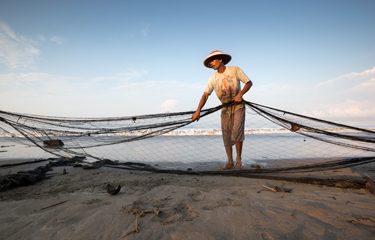Traditional investors have long overlooked coastal fisheries in emerging markets, deterred by poor data, management challenges, and unpredictability. But an infusion of capital may be exactly what some of those fisheries need to take the next step in improving both sustainability and the livelihoods of local fishermen.
The Meloy Fund for Sustainable Community Fisheries, an impact investment fund affiliated with the conservation group Rare, is seeking to set off a wave of investment in coastal fisheries in Southeast Asia, where it believes impact capital can do the greatest good for both fishermen and nature. The hope is that banks, venture capital, and private equity will eventually join in.
"We had to take on a little risk to be first, and certainly our investors did the same," Meloy Fund Managing Partner Dale Galvin told SeafoodSource. "It's a risky sector. It has a lot of seasonality to it and it's poorly understood, especially when it comes to the product.”
Earlier this month, the Meloy Fund announced an investment in Indonesian tuna processor and exporter PT SIG. The investment is meant to spur PT SIG, which sources yellowfin tuna from artisanal fishermen and exports it globally, to make direct improvements in its traceability system, a transparent pricing scheme for fishermen, and a responsible sourcing policy.
“At PT SIG Asia, we take pride in our products and our strong relationships with our customers and the local fishing community," PT SIG Asia Founder and CEO Daniel Loy said in a statement. "This partnership with the Meloy Fund gives us an opportunity to expand our company, implement value-generating environmental, social, and governance-compliant practices, and expand our leadership in the sustainable seafood industry in our region.”
The Meloy Fund chooses investments that will both improve livelihoods and protect natural resources. It targets the Philippines and Indonesia, where there are 4.3 million small-scale fishers harvesting 2.7 million tons of fish — an untapped value of USD 4 billion (EUR 3.7 billion).
The fund targets businesses too large for microfinance but too small for private equity, supporting growth-stage enterprises. It seeks to invest between USD 1 million (EUR 930,000) and USD 5 million (EUR 4.6 million) in debt or equity.
The Meloy Fund focuses on coastal areas because they contain 90 percent of the jobs, 90 percent of biodiversity, and half the fish, Galvin said.
"Our job is to do as much as possible to support that artisanal side of that and make sure it's done responsibly and sustainably," Galvin said. "This is a completely overlooked part of the ocean."
PT SIG will also be expected to contribute to fishery-wide efforts that require collective action, such as pursuing Marine Stewardship Council certification. It will participate in fishery improvements led by the Indonesian Pole & Line and Handline Fisheries Association. Beyond the investment itself, the Meloy Fund deploys a technical assistance grant fund that it uses to sponsor projects that are beyond the sole scope of the company.
The Meloy Fund isn't announcing specific deal sizes, but Galvin did say that the deal with PT SIG had debt-like instruments that allowed the fund to succeed if the company succeeds.
The Meloy Fund identified PT SIG through its regional networks in Southeast Asia. It was the type of company that could make significant improvements with an infusion of capital – and the help of Meloy’s partnership.
"They have a really good reputation among customers and among suppliers and boat owners," Galvin said. "Is it a company that is at least willing to consider if not embrace the opportunity that becoming a more sustainably-minded business presents? SIG ticked the boxes."
Like other investment agreements that Meloy makes, the structure of the investment contains both carrots and sticks to encourage PT SIG to adopt certain sustainability principles.
"We don't just tell them what to do. We work with them on what that plan of action is, and then that is baked into the legal agreement," Galvin said.
With the COVID-19 pandemic disrupting supply chains, the Meloy Fund is committing to helping its companies and constituents in Southeast Asia by ensuring financial liquidity for companies and making sure employees are being taken care of through furloughs, Galvin said. The fund is also putting together some aid packages of health and safety equipment as well as staple food supplies.
Improving sustainability practices isn't just good for society or nature, Galvin argued. it's good for business – and that’s especially true for businesses that rely heavily on a healthy natural environment, such as seafood.
"It's a mutual agreement that these actions are good for business and for people and nature," Galvin said. "They understand that's a business need and not just a nice thing to do.”
While sustainable practices might allow seafood producers to charge a slight premium, the reality is that evidence of sustainability commitments is increasingly the prerequisite to sell to certain markets. Large chains such as Walmart and some hotel chains, plus certain governments – such as the entire European Union – require sustainable practices, Galvin said.
"It's the price of entry," Galvin said. "You're not getting into Whole Foods if you're not getting that certification."
Photo courtesy of Chen WS/Shutterstock







